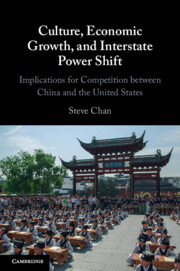
- Publisher:
- Cambridge University Press
- Online publication date:
- February 2024
- Print publication year:
- 2024
- Online ISBN:
- 9781009465540


A country's culture influences its economic growth, which in turn influences its international position. Confucian heritage appears to be the common factor explaining the rapid economic growth of East Asian countries, including China's meteoric rise in recent years. Ironically, Confucianism has been criticized not too long ago for hindering progress in these countries. At the same time, Protestant countries, once the vanguards of economic development, have seen weak growth., These developed economies are undergoing a cultural transformation from an emphasis on materialist concerns to postmaterialist ones. What do these trends augur for their economic growth and international competitiveness, particularly in the context of ongoing power shifts between China and the United States?
‘In Culture, Economic Growth, and Interstate Power Shift, Chan revisits some of the old themes but produces a refreshingly innovative book. The book brings culture back into the debate over China’s growth trajectory. While the literature looks at U.S.-China competition in dyadic terms, Chan’s comparative analysis shows how they each organize their domestic political economy matters, particularly warning against overreach in defense budget while underscoring the importance of technological innovation.’
Yong Deng - Professor of Political Science, U.S. Naval Academy, and author of China’s Strategic Opportunity: Change and Revisionism in Chinese Foreign Policy (2022)
‘Chan’s remarkable book intricately explores the interplay between culture, economic growth, and the enduring competition between the United States and China. It sheds light on the profound influence of economic advancement on a nation’s power and competitive positioning in global affairs. Delving into the essence and potential future of the US–China competition, the book also addresses the pivotal role institutions play in bridging the gap between culture and a state’s capacity for innovation. A compelling must-read for those intrigued by US-China relations and global geopolitics.’
Kai He - Professor of International Relations, Griffith University, and author of Contesting Revisionism: China, the United States, and the Transformation of International Order (2021)
 Loading metrics...
Loading metrics...
* Views captured on Cambridge Core between #date#. This data will be updated every 24 hours.
Usage data cannot currently be displayed.